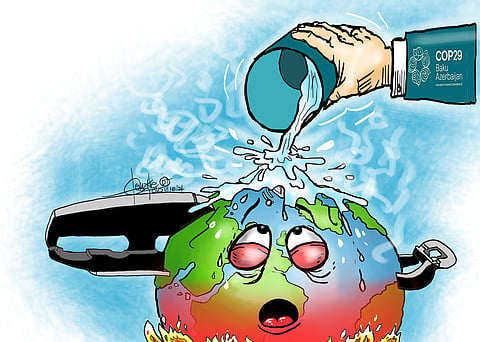
- NEWS
- the EDIT
- COMMENTARY
- BUSINESS
- LIFE
- SHOW
- ACTION
- GLOBAL GOALS
- SNAPS
- DYARYO TIRADA
- MORE

Thousands of people from across the globe are in Baku, Azerbaijan for the United Nations Climate Change Conference or COP (Conference of the Parties) 29, the global climate conference organized annually by the UN Framework Convention on Climate Change (UNFCCDC) which started on Monday, 11 November.
United Arab Emirates President Sultan Ahmed Al Jaber has turned over the COP leadership to Azerbaijan Minister for Ecology and Natural Resources Mukhtar Babayev. In his outgoing remarks, the COP 28 president mentioned the Philippines, saying, “We have made progress on the Loss and Damage Fund with $853 million pledged to date and we have named the Philippines as the host country for the (Fund) board.”
Now with a prominent role in international climate talks as the Loss and Damage Fund Board host, the Philippines is expected to intensify the call to make global polluters pay. Philippine delegation head Environment and Natural Resources Secretary Toni Yulo-Loyzaga said, “I am, at best, cautiously optimistic.”
With “limited fiscal space,” she said, “we need to have urgent access to the best science along with new additional and appropriate financing and innovative mechanisms and instruments from public and private sources.”
As COP 29 host, Azerbaijan will oversee this year’s conference with money for loss and damage and fossil fuel transition, along with climate change, as top items on the agenda.
The summit takes place with the US, one of the world’s top greenhouse gas emitters, voting known climate change denier Donald Trump back into the White House.
With Trump back in power, climate advocates anticipate an aggressive expansion in fossil fuel generation, along with US withdrawal from all climate commitments forged by the Biden administration.
“Trump is not a man of reason or science, and he is devoid of compassion for humanity and the planet,” said a statement by Jubilee South, an international advocacy group on climate justice.
Still, the work must go on. This year’s COP 29 will expend efforts to reach such agreements as a new annual climate finance target, a deal to get multilateral carbon credit markets working, and more aid money pledged for countries battered by climate disasters.
These efforts are aligned with the central goal of this year’s summit, dubbed the “climate finance COP,” that is, agreeing on how much money should go each year to help developing countries cope with climate-related costs.
“Let’s dispense with any idea that climate finance is charity,” said UN climate chief Simon Steill who told COP 29 negotiators that setting an ambitious new climate finance target is crucial for the well-being of all nations, including the wealthiest and most powerful.
“Runaway climate change impacts every individual in the world one way or another,” he said, underscoring that the UNFCC process is the only place where “we can address rampant climate crisis, and credibly hold each to account and act on it. We know this process is working because, without it, humanity would be headed towards five degrees of global warming.”
“No country is immune,” stressed Stiell, who envisions a dark picture of the global economy collapsing if countries fail to strengthen their supply chains amid rising costs linked to climate shocks.
“I’m as frustrated as anyone that a single COP can’t deliver the full transformation each nation needs. But it is here that Parties need to agree a way out of this mess. That’s why here in Baku, we must agree on a new global climate finance goal,” said Stiell, whose home island of Carrriacou in Grenada was nearly flattened in July by Hurricane Beryl.
